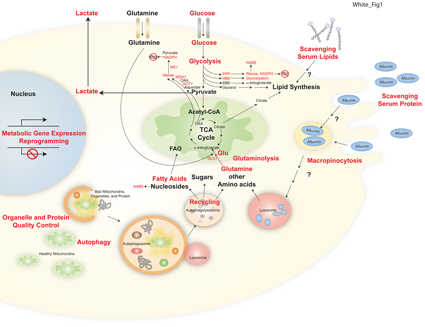Our Research
Current research of the White Laboratory at Rutgers Cancer Institute has focused on translational research modulating the apoptosis pathway for cancer therapy and on the role of autophagy and cellular metabolism in cancer progression and treatment. The White group discovered that tumor cells activate the cellular self-cannibalization process of autophagy to survive the stress of tumor growth. This was the first demonstration that autophagy is a cancer survival mechanism for solid tumors and that inhibition of autophagy may be a novel approach to improve solid tumor therapy.
In collaboration with the laboratory of Dr. Josh Rabinowitz at Princeton University the White group went on to demonstrate that tumor cells require autophagy to sustain tumor metabolism and survival. In Ras-driven cancers, autophagy is induced and critical for tumor growth. In models of Ras-driven lung cancer, autophagy is required for progression to aggressive carcinomas, as autophagy blockade causes lung tumors instead to progress to benign oncocytomas. Thus, autophagy promotes the growth and progression of lung cancer to aggressive disease, and autophagy inhibition is a novel means to suppress lung tumor growth and divert progression to benign disease. Clinical trials to test this concept are underway.
Projects
Tumor Cell Metabolism in Action
Award # 2R01CA163591-11A1
PI: Drs. Eileen White & Joshua Rabinowitz
This competing renewal of the collaborative multi-PI R01 grant application outlined here is to determine metabolic heterogeneity across cell types in the tumor microenvironment. Work in all aims has a significant contribution from the investigators at Rutgers University.
Cancer Center Support Grant
Award # 2P30CA072720-25
PI: Drs. Eileen White & Steven Libutti
The goal of the grant is to provide an organizational focus and stimulus for the highest quality cancer research that effectively promotes interdisciplinary scientific research, and to take maximum collective advantage of scientific opportunities and institutional resources aimed toward the goal of reducing cancer incidence, morbidity and mortality. Funds from this grant support Rutgers Cancer Institute Cores and Program meetings. Dr. White is Chief Scientific Officer and the Deputy Director for Rutgers Cancer Institute and receives a small amount of salary support from this grant.
Impact of Mutation Burden on the Cancer Immune Landscape
Award # 5R01CA243547-05
PI: Dr. Eileen White
The goal of this project is to model increased tumor mutation burden in mice to examine the impact on the anti-tumor immune response and response to immune checkpoint blockade. Dr. White is responsible for developing the mouse models for cancer with altered mutation burden in the nuclear and mitochondrial genomes.
Ludwig Institute for Cancer Research
Award # N/A
PI: Dr. Eileen White
Research spanning metabolic interaction between host and tumor, dietary modulation of cancer and therapy, and metabolic regulation of the anti-cancer immune response. Dr. White is Associate Director of the Ludwig Princeton Branch at Princeton University.
Cancer Grand Challenge
Award # N/A
PI: Dr. Eileen White
The major goals of this project are to lead a basic, translational and clinical research team to determine the mechanisms underlying cancer cachexia and to develop therapeutics and clinical centers with which to eradicate it. Dr. White is the Lead PI.
Fasting and Cancer Prevention, Growth and Treatment
Award # N/A
PI: Dr. Eileen White
To determine the role of fasting in cancer prevention using pre-clinical cancer models.


